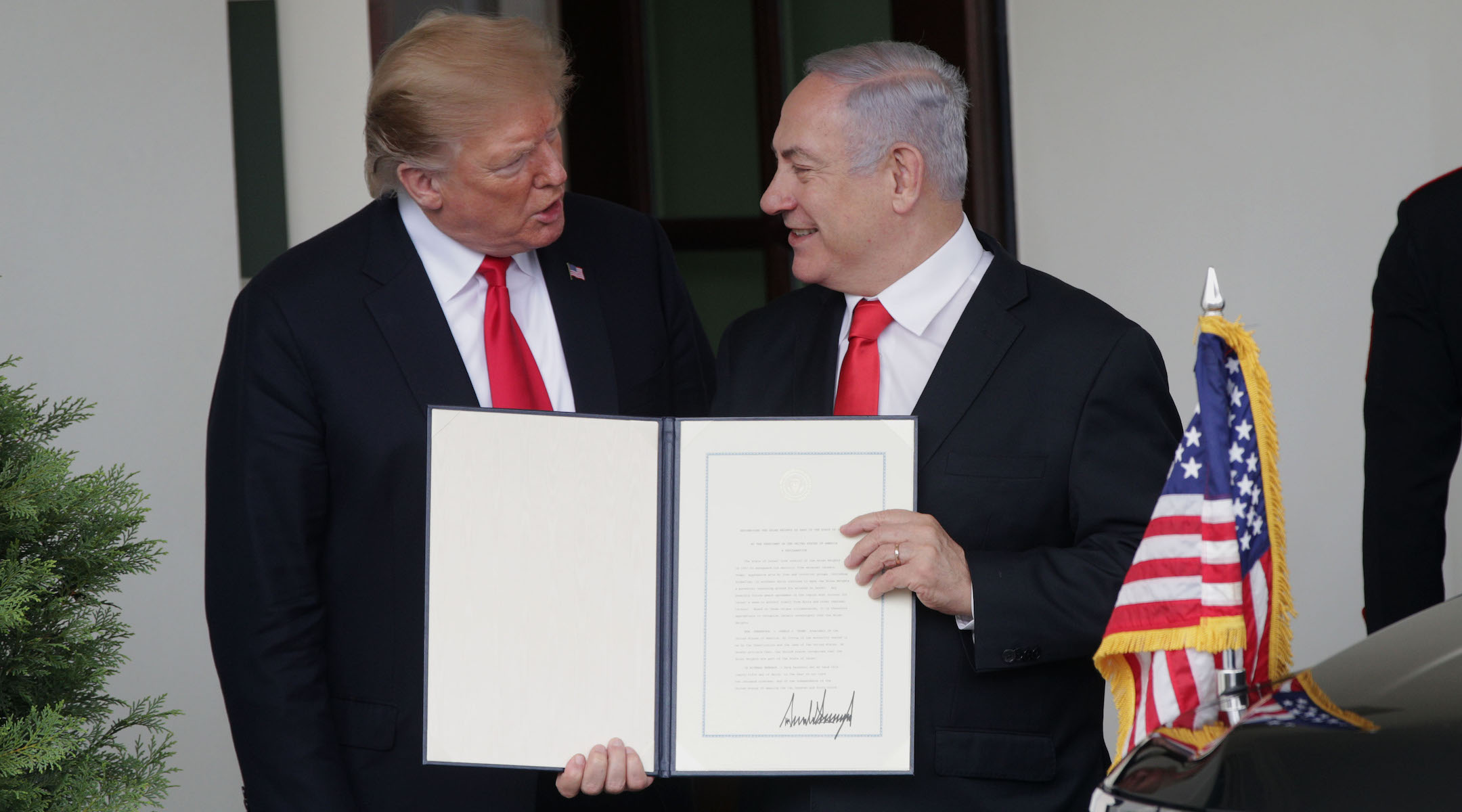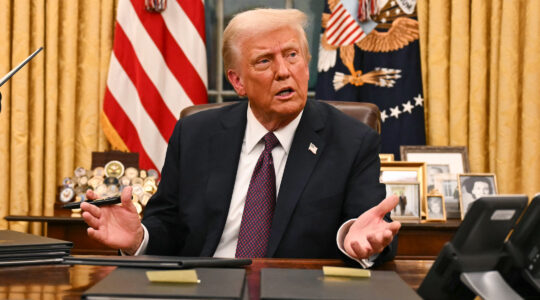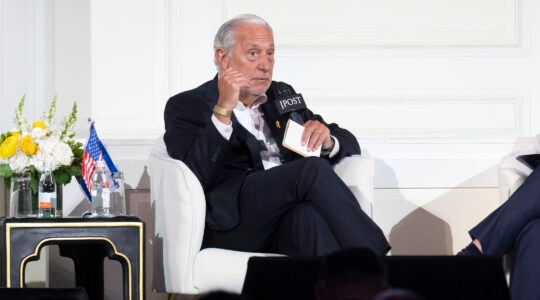LAS VEGAS (JTA) — The latest 2020 election fault line between Republicans and Democrats, and to a degree among Democratic presidential candidates, is Benjamin Netanyahu.
At least five of the Democratic presidential candidates, ranging from the Israel-critical to the AIPAC-aligned, have rebuked the Israeli prime minister just days ahead of his re-election bid on Tuesday after he pledged to annex Jewish settlements in the West Bank. Beto O’Rourke went so far as to call Netanyahu racist.
“The U.S.-Israel relationship is one of the most important relationships we have on the planet,” O’Rourke said while campaigning in Iowa this weekend, “and that relationship, if it is successful, must transcend partisanship in the United States, and it must be able to transcend a prime minister who is racist.”
Pete Buttigieg and Bernie Sanders also criticized Netanyahu’s annexation pledge while claiming it doesn’t make them anti-Israel.
President Donald Trump, meantime, held up his friendship with Netanyahu as a reason that Jewish voters should leave their traditional Democratic Party home.
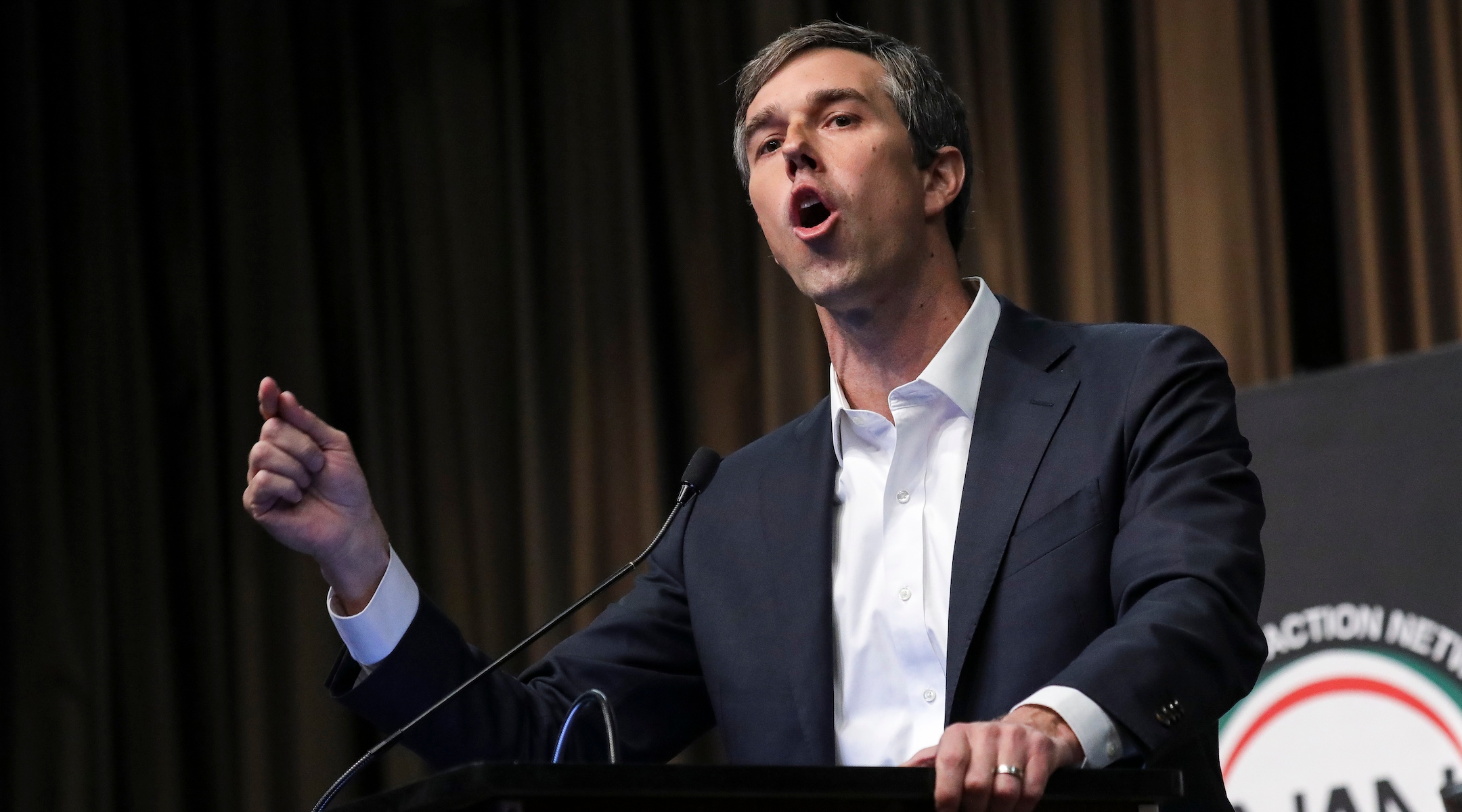
Democratic presidential candidate Beto O’Rourke speaks in New York City at the National Action Network’s annual convention, April 3, 2019. (Drew Angerer/Getty Images)
Netanyahu has also raised liberal ire recently by embracing several authoritarian leaders from other countries and retreating from support for a two-state solution. Many liberals believe his efforts to push Trump to recognize Israeli sovereignty in the Golan Heights have also harmed the Middle East peace process.
How the Democrats treat Netanyahu is indicative of the emerging Israel fault line within their party between progressives who have become increasingly bold in denouncing the Israeli leader and his hawkish policies and moderates who do not want to give President Donald Trump any help in his bid to depict Democrats as anti-Israel.
Sen. Amy Klobuchar, D-Minn., campaigning in Nevada, a key caucus state, told the Jewish Telegraphic Agency that she was unhappy with Netanyahu’s West Bank announcement but also emphasized her pro-Israel credentials.
“I’m for the two-state solution and I don’t favor what Netanyahu did this weekend,” she said. “I don’t favor the annexation; I think we should have a two-state solution.”
An older man interrupted her meeting with local Democratic activists in suburban Las Vegas on Sunday, saying “Israel oppresses Palestinians.” But Klobuchar cut him off, saying “We’ve talked about that.”
Klobuchar’s impatience with the activist underscored the difficulties moderate Democrats may face in handling the party’s progressive base, which has grown increasingly hostile to Netanyahu, a villain for the Democratic left at least since 2015 when he worked behind the scenes with Republicans to speak in Congress against President Barack Obama’s Iran nuclear deal.
MoveOn, the progressive advocacy group, called on Democratic presidential candidates to boycott last month’s American Israel Public Affairs Committee conference, in part because Netanyahu was a featured speaker. Klobuchar, perhaps the Democratic candidate closest to AIPAC, met with a delegation from the Israel lobby that came to her office during the conference.
“I met with my local AIPAC group, I was proud to do that, and I was proud to be a strong supporter of Israel, my voting record has shown that,” she said.
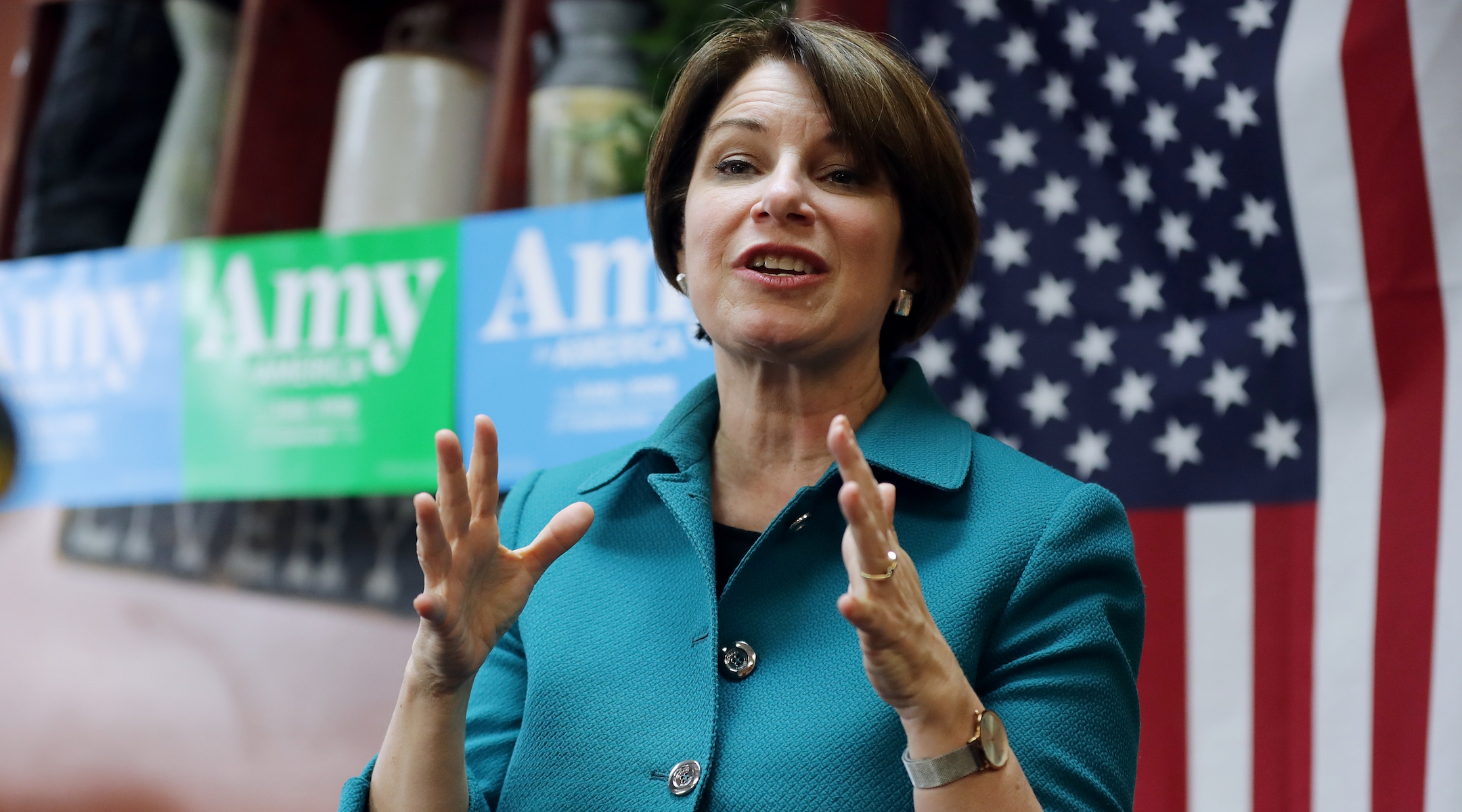
Sen. Amy Klobuchar campaigns for the Democratic presidential nomination in Independence, Iowa, March 16, 2019. (Chip Somodevilla/Getty Images)
Trump, appearing here this weekend at the annual conference of the Republican Jewish Coalition, played up his relationship with Netanyahu, noting how the prime minister stood at his side as Trump signed the proclamation recognizing the Golan as Israel’s sovereign territory.
“I stood with your Prime Minister Netanyahu at the White House to recognize sovereignty over the Golan Heights,” he said to cheers. “How’s the race going?” he asked, referring to Tuesday’s Israeli election.
Trump has been seen as boosting Netanyahu ahead of the election through the Golan recognition, a high-profile visit to Israel by his secretary of state, Mike Pompeo, and by sharing a Netanyahu election ad on social media.
Trump and other speakers at the RJC conference urged those attending to persuade Jewish Democrats to leave the party, saying it is giving voice to anti-Israel activists.
Klobuchar said Democrats must resist Trump’s efforts to make Israel a partisan issue.
“I just spoke at a major Jewish gathering in Los Angeles about this, and I did it with [Nebraska Republican Sen.] Ben Sasse to make the point we have to get through all of this,” she said. “I do not like how the president has been using Israel as a divide because you’re going to start losing the bipartisan support that is so important. Israel is our beacon for democracy in the Mideast.”
Buttigieg — the mayor of South Bend, Indiana, who is surprising many with his successful upstart campaign — like Klobuchar is a moderate with a close relation to a pro-Israel group. In his case it’s the American Jewish Committee, whose Project Interchange hosted Buttigieg in Israel last year.
“This provocation is harmful to Israeli, Palestinian, and American interests,” Buttigieg said Saturday on Twitter, referring to Netanyahu’s annexation pledge. “Supporting Israel does not have to mean agreeing with Netanyahu’s politics. I don’t. This calls for a president willing to counsel our ally against abandoning a two-state solution.”
O’Rourke, who has attracted substantial funding, has been the most outspoken of the Democrats condemning Netanyahu. Speaking in Iowa, the first caucus state, he pointed out that Netanyahu formed an election alliance with a far-right party that has its roots in the teachings of Meir Kahane, the late racist rabbi.
“This is someone, who in a previous election, warned Arabs were coming to the polls,” O’Rourke said. “It’s racism. This is someone who no longer subscribes to a two-state solution and has vowed to annex the West Bank, which will make peace, in the long term, impossible. This is someone who has joined far-right parties who are inherently racist in their speech and the way they want to treat their fellow human beings in that part of the world.”
Sanders, the progressive flag-bearer since his surprisingly strong 2016 run for the presidential nomination, was scathing, too, as he campaigned in Iowa.
“I think that Benjamin Netanyahu is an extreme right-wing leader in Israel,” the Vermont Independent senator told Marc Daniels, a Jewish activist who tracks presidential campaigns. “I do not support his policies, and I think that to speak out against Netanyahu is not to be anti-Israel. And what I believe is that we, in fact, need a two-state solution to the Middle East ongoing crisis and that the United States needs to have an even-handed policy.”
Another Democratic candidate, Julian Castro, also weighed in against the annexation pledge and criticized the Trump administration for providing the impetus.
“In abandoning our position as a good faith partner in the Middle East peace process, the Trump admin has enabled reckless actions like this from Netanyahu,” the former San Antonio mayor and a Cabinet member under President Barack Obama tweeted. “US support for a two-state solution is on the line in November 2020.”
For moderates like Klobuchar and Buttigieg — as well as Sens. Kamala Harris and Cory Booker, who also have strong AIPAC relationships — navigating the territory between criticizing Netanyahu and standing up for Israel will become more difficult should Netanyahu be re-elected and press ahead with the West Bank annexation.
Trump administration officials have suggested that they’re on board with it, even though Pompeo on Monday refused to comment on Netanyahu’s announcement. Speaking at the AIPAC conference, U.S. Ambassador to Israel David Friedman, one of the architects of the still-to-be-unveiled Trump administration peace plan, said it would keep Israel in security control of the West Bank.
Compounding the problem for moderates is a Democratic base eager for a fighter to give Trump as good as he gets. At the Las Vegas event, Klobuchar was asked repeatedly how she would take on the president’s take-no-prisoners style — with humor, dignity and truth, she said. The Minnesota lawmaker emphasized her record of working with Republicans to get bills passed, but also called herself a progressive.
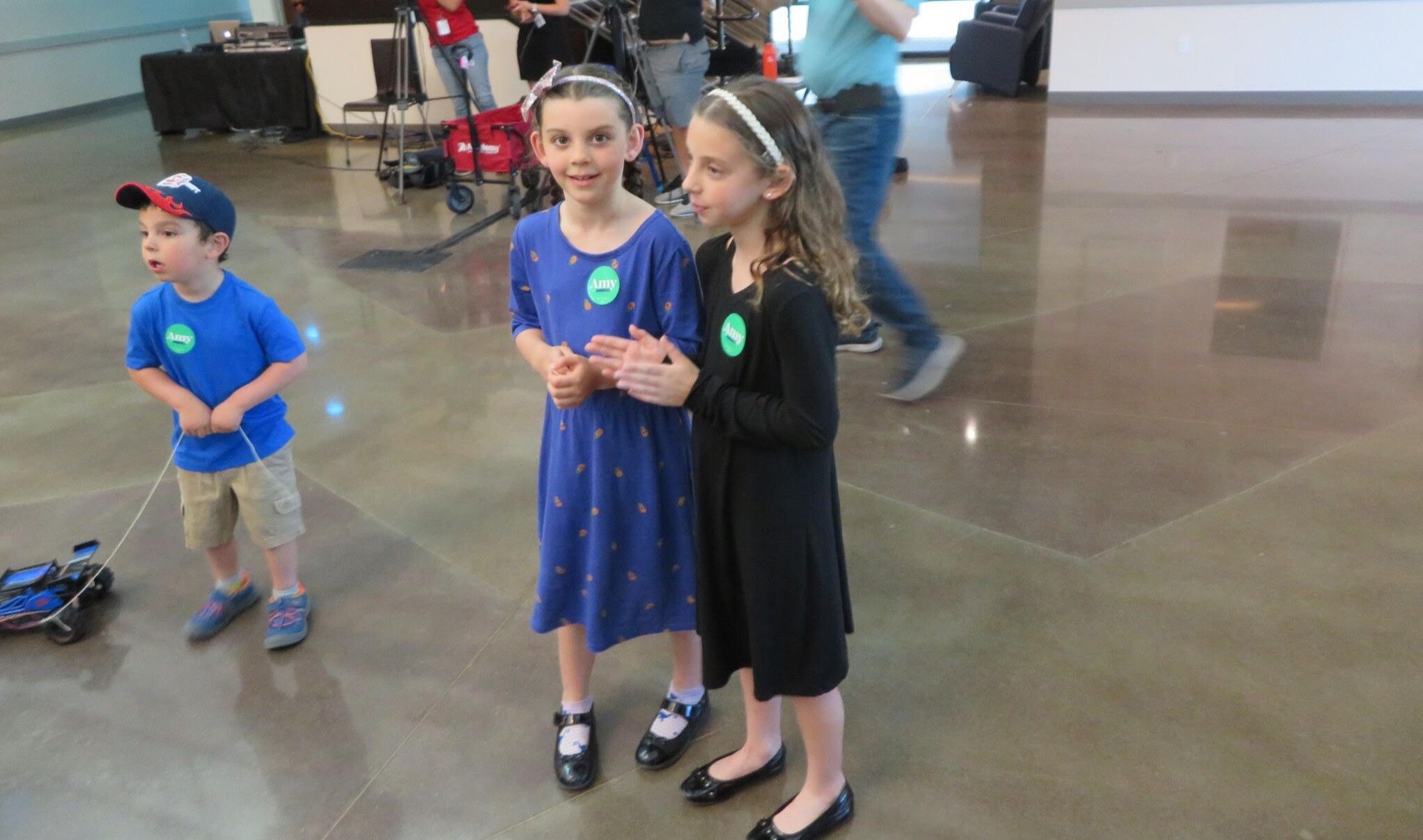
Benjy Rothman, 4, and his sisters Dassie, 8, and Adina, 7 wait to see Sen. Amy Klobuchar in Las Vegas, April 7, 2019. (Ron Kampeas)
That might not cut it for Levi Rothman, who owns a local construction business and brought his three children to the Las Vegas event to see Klobuchar, in part because he wanted his daughters — Dassie, 8, Adina, 7, and Benjy, 4 — to see women as role models.
“She’s moderate, middle of the road,” Rothman said. “But I might be in the mood for a blowtorch.”
JTA has documented Jewish history in real-time for over a century. Keep our journalism strong by joining us in supporting independent, award-winning reporting.
